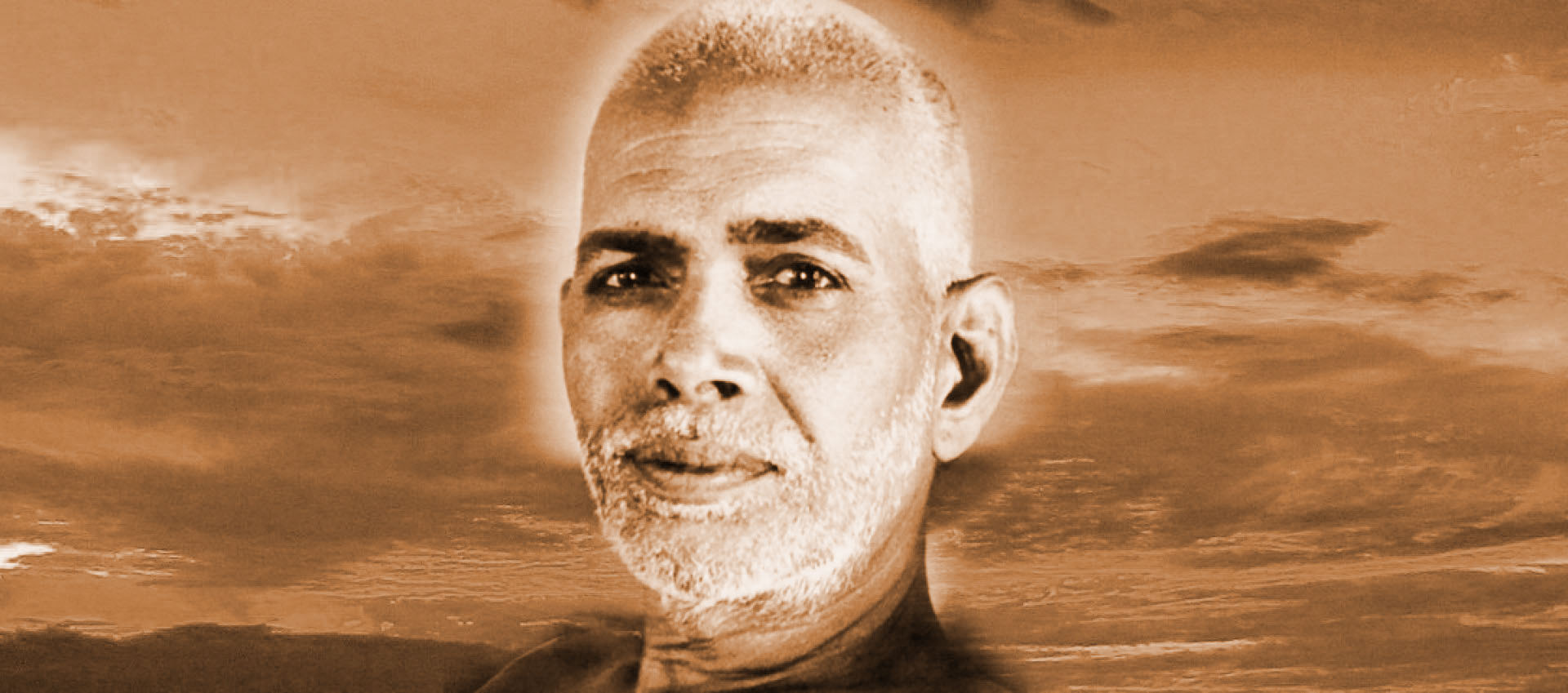
Tripura Rahasya – Chapter 1
Sri Ramana Maharshi considered “Tripura Rahasya” as one of the greatest works that expounded Advaita Philosophy. He often quoted from it and regretted that it was not available in English. As a consequence Sri Munagala Venkataramaiah, an ardent devotee of Sri Ramana Maharshi, took up the work of translation in 1936.
CHAPTER I
1. Salutation to Aum (undifferentiated Brahman, and yet the) Primal and Blissful cause, the transcendental consciousness shining as the unique mirror of the wonderful universe:
Note: – The one undifferentiated Brahman signified by Aum polarises as Sat-chit-ananda taking shape as Parameswari who, in Her crystal purity, displays the variegated phenomena which gyrate in equipoise within Her. Neutral Brahman and the polarised Brahman are thus interchangeable. The idea of the mirror implies the non-separateness of the object from the subject (conscious being).
2. Harithayana said :
“Undisturbed you have heard, O Narada! the Mahatmya (The Gospel) of Sri Tripura, which teaches the way to Transcendence.”
Note: – Thus begins the latter part of the book; the first part deals with a narrative of Devi (Sakti – Sri Tripura), Her worship and Her grace. Tripura literally means the three cities. They are the states – Jagrat, Svapna and Shushupti. The undercurrent of consciousness in all of them, remaining unaffected, is metaphorically called the Resident Mistress by name Sri Tripura. The procreative faculty generating new beings and the link of altruistic love connecting the offspring to the parent are personified in the Mother. Hence the feminine termination of Tripura. “The way to transcendence” signifies that interest in Tripura purifies the mind and creates the zeal for enquiry into the Truth. The listener is now fit for the ensuing discourse on wisdom.
3. I shall now discourse on wisdom, which is unique because one will be permanently freed from misery, by hearing it.
4. This is the concentrated extract of the essence of the Vedic, Vaishnava, Saiva, Satkta and Pasupata lore taken after a deep study of them all.
5-7. No other course will impress the mind so much as this one on Wisdom which was once taught by that illustrious master Dattatreya to Parasurama. The teaching was born of his own experience, logical in sense and quite unique in its nature. One who cannot apprehend Truth even after hearing this must be dismissed as a silly fool to be ranked among the insentient and accursed of God; Siva himself cannot make such an one gain wisdom.
8. I now proceed to relate that incomparable teaching. Listen! Oh, the lives of Sages are most sacred!
9-11. Narada too served me to learn the same from me; for, service to sages enables one to apprehend their innate kindness, just as the sense of smell helps one to detect the intrinsic odour of musk.
As Parasurama, the son of Jamadagni, already pure-minded and pleasing to all, was listening to the Gospel of Tripura from the lips of Dattatreya, he became abstracted in devotion and so growing still for a time, his mind became still purer.
12-13. Then as the mind relaxed, his eyes glowed in rapture and his hair stood on end, as if his ecstasy could not be contained within but must escape through the very pores of his body. He then fell to the ground before his master Datta.
14. Again he arose, and being filled with ecstasy, his voice choked with emotion as he said: ‘Lucky am I; blessed am I; through Thy Grace O Lord!’
15. That expanse of Grace called Siva, here incarnate as my Guru, is indeed gracious to me; gaining whose pleasure even the Lord of creation, looks a pigmy.
16. Does not the God of Death verily merge into the Self, if only one’s master is pleased with one?
That Supreme Being is gracious indeed, just in so much as is my Master, for reasons unknown to me.
Note: – The meaning is that the Guru, being God, is mercy incarnate and requires no incentive to show grace.
17. The Guru’s grace gained, I have gained all! Thou hast now kindly opened out to me the glory of Tripura.
18. I now desire fervently to worship Her Transcendental Majesty. Kindly tell me, my Master, how it is to be done.
19-22. Being thus requested, Datta Guru satisfied himself as to the fitness of Parasurama, whose zeal for and devotion to Tripura worship were intense; and he duly initiated him into the method of Her worship. After initiation into the right method, which is more sacred than all others and leads directly to Realisation, Parasurama learned from the sweet tips of Sri Guru all the details regarding recitation figures for worship and different meditations, one after another – like a honey bee collecting honey from flowers. Bhargava (i.e., Parasurama) was overjoyed.
23. Being then permitted by his holy master, he thirsted to practise the sacred lore; he went round his master, made obeisance to him and retired to the Mahendra Hill.
Note: – To walk round gently and peaceful, always keeping the centre to one’s right, is a sign of respect to the object in the centre.
24. There, having built a clean and comfortable hermitage, he was engaged for twelve years in the worship of Tripura.
25. He incessantly contemplated the figure of that Holy Mother Tripura, performing at the same time his daily tasks and the special ceremonies connected with Her worship and recitations; twelve years thus passed in a flash. Then on a certain day while the son of Jamadagni was sitting at ease, he fell into a reverie.
27. “I did not understand even a little of what Samvarta told me whom I met formerly on the way.”
28. “I have also forgotten what I asked my Guru. I heard from him the Gospel of Tripura, …
29. … but it is not clear to me what Samvarta said in reply to my query on creation.”
30. “He mentioned the story of Kalakrit, but went no further, knowing that I was not fit for it.”
31. “Even now I understand nothing of the workings of the universe. Where does it rise from, in all its grandeur?”
32. “Where does it end? How does it exist? I find it to be altogether transient.”
33. “But worldly happenings seem permanent; why should that be? Such happenings seem strangely enough to be unconsidered.”
34. “How strange! They are on a par with the blind man led by the blind!”
35. “My own case furnishes an example in point. I do not even remember what happened in my childhood.”
36. “I was different in my youth, again different in my manhood, still more so now; and in this way, my life is constantly changing.”
37-38. “What fruits have been reaped as the result of these changes is not clear to me. The end justifies the means as adopted by individuals according to their temperaments in different climes and in different times. What have they gained thereby? Are they themselves happy?
39. “The gain is only that which is considered to be so by the unthinking public. I however cannot deem it so, seeing that even after gaining the so-called end, the attempts are repeated.
Note: – Since there is no abiding satisfaction in the gain, it is not worth having.
40-41. “Well, having gained one purpose, why does man look for another? Therefore, what the man is always after should be esteemed the only real purpose – be it accession of pleasure or removal of pain. There can be neither, so long as the incentive to effort lasts.”
42. “The feeling of a need to work in order to gain happiness (being the index of misery) is the misery of miseries. How can there be pleasure or removal of pain so long as it continues?
43-45. “Such pleasure is like that of soothing unguents placed on a scalded limb, or of the embrace of one’s beloved when one is lying pierced by an arrow in the breast; or of the sweet melodies of music heard by an advanced consumptive!
46. “Only those who need not engage in action, are happy; they are perfectly content, and self-contained, and they experience happiness which extends to all the pores of the body.
47. “Should there still be a few pleasurable moments for others, they are similar to those enjoyed by one who, while writhing with an abdominal pain, inhales the sweet odour of flowers.
48. “How silly of people with innumerable obligations ever to be busy seeking such moments of pleasure in this world!”
49. “What shall I say of the prowess of undiscriminating men? They propose to reach happiness after crossing interminable hurdles of efforts!”
50. “A beggar in the street labours as much for happiness as a mighty emperor.”
51-52. “Each of them having gained his end feels happy and considers himself blessed as if he had reached the goal of life. I too have been unwittingly imitating them like a blind man following the blind. Enough of this folly! I will at once return to that ocean of mercy – my Master.”
53. “Learning from him what is to be known, I will cross the ocean of doubts after boarding the boat of his teachings.”
54. Having resolved thus, Parasurama of pure mind immediately descended the hill in search of his Master.
55. Quickly reaching the Gandhmadan Mountain, he found the Guru sitting in padmasana posture as if illumining the whole world.
56. He fell prone before the Master’s seat and, holding the Guru’s feet with his hands, pressed them to his head.
57. On Parasurama saluting him thus, Dattatreya gave him his blessings, his face lit with love, and he bade him rise saying:
58. “Child! rise up. I see you have returned after a long time. Tell me how are you? Are you in good health?”
59. He rose as commanded by his Guru, and took his seat in front of and close to him as directed. Clasping his hands, Parasurama spoke with pleasure.
Note: – Clasping the two hands with fingers directed towards the object, is a sign of respect.
60. “Sri Guru! Ocean of Mercy! Can any one drenched with Thy kindness ever be afflicted by ailments even if destiny so decree?”
61. “How can the burning pains of illness touch one who is abiding in the refreshing moon of Thy nectarlike kindness?”
Note: – The moon is believed to be the store of nectar with which the pitris feed themselves.
62-64. “I feel happy in body and mind, being refreshed by Thy kindness. Nothing afflicts me except the desire to remain in unbroken contact with Thy holy feet. The very sight of Thy holy feet has made me perfectly happy, but there are a few longstanding doubts in my mind.”
65. “With Thy kind permission I desire to propound them.”
66. Hearing the words of Parasurama, Dattatreya, the Ocean of kindness, was pleased and said to him.
67. “Ask at once, O Bhargava, what you so much want to know and what you have so long been thinking about. I am pleased with your devotion and shall answer your questions with pleasure.”
Thus ends the First Chapter known as the Interrogatory of Bhargava in Sri Tripura Rahasya.

